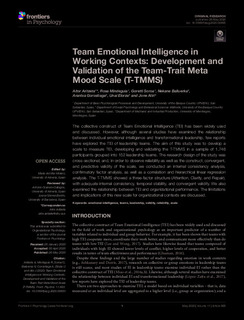| dc.rights.license | Attribution 4.0 International | * |
| dc.contributor.author | Elorza, Unai | |
| dc.contributor.other | Aritzeta Galan, Aitor | |
| dc.contributor.other | Mindeguia, Rosa | |
| dc.contributor.other | Soroa Martinez, Goretti | |
| dc.contributor.other | Balluerka Lasa, Nekane | |
| dc.contributor.other | Gorostiaga, Arantxa | |
| dc.date.accessioned | 2021-03-30T14:48:05Z | |
| dc.date.available | 2021-03-30T14:48:05Z | |
| dc.date.issued | 2020 | |
| dc.identifier.issn | 1664-1078 | en |
| dc.identifier.other | https://katalogoa.mondragon.edu/janium-bin/janium_login_opac.pl?find&ficha_no=162791 | en |
| dc.identifier.uri | https://hdl.handle.net/20.500.11984/5264 | |
| dc.description.abstract | The collective construct of Team Emotional Intelligence (TEI) has been widely used and discussed. However, although several studies have examined the relationship
between individual emotional intelligence and transformational leadership, few reports have explored the TEI of leadership teams. The aim of this study was to develop a scale to measure TEI, developing and validating the T-TMMS in a sample of 1,746 participants grouped into 152 leadership teams. The research design of the study was cross-sectional, and, in order to observe reliability as well as the construct, convergent, and predictive validity of the scale, we conducted an internal consistency analysis, confirmatory factor analysis, as well as a correlation and hierarchical linear regression analysis. The T-TMMS showed a three-factor structure (Attention, Clarity, and Repair), with adequate internal consistency, temporal stability, and convergent validity. We also examined the relationship between TEI and organizational performance. The limitations and implications of this new scale for organizational contexts are discussed. | en |
| dc.description.sponsorship | Diputación Foral de Gipuzkoa | es |
| dc.language.iso | eng | en |
| dc.publisher | Frontiers Media S.A. | en |
| dc.rights | © 2020 Aritzeta, Mindeguia, Soroa, Balluerka, Gorostiaga, Elorza and Aliri | en |
| dc.rights.uri | http://creativecommons.org/licenses/by/4.0/ | * |
| dc.subject | emotional intelligence | en |
| dc.subject | teams | es |
| dc.subject | leadership | en |
| dc.subject | validity | en |
| dc.subject | reliability | en |
| dc.subject | scale | en |
| dc.title | Team Emotional Intelligence in Working Contexts: Development and Validation of the Team-Trait Meta Mood Scale (T-TMMS) | en |
| dcterms.accessRights | http://purl.org/coar/access_right/c_abf2 | en |
| dcterms.source | Frontiers in Psychology | en |
| local.contributor.group | Innovación, gestión, organización | es |
| local.description.peerreviewed | true | en |
| local.identifier.doi | https://doi.org/10.3389/fpsyg.2020.00893 | en |
| local.relation.projectID | DFG/Promoción del talento y el aprendizaje de las personas en las empresas 2019//GIP/Balore eta konportamendu Kooperatibo konstruktiboen sustapena antolakuntzen emaitzak hobetzeko/BATERATZEN 19-20 | en |
| local.rights.publicationfee | APC | en |
| local.rights.publicationfeeamount | 2500 EUR 2950 USD | en |
| local.contributor.otherinstitution | UPV/EHU | es |
| local.source.details | Vol. 11. N. artículo 893, 2020 | en |
| oaire.format.mimetype | application/pdf | |
| oaire.file | $DSPACE\assetstore | |
| oaire.resourceType | http://purl.org/coar/resource_type/c_6501 | en |
| oaire.version | http://purl.org/coar/version/c_970fb48d4fbd8a85 | en |








